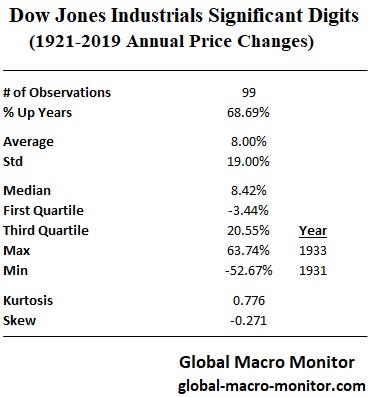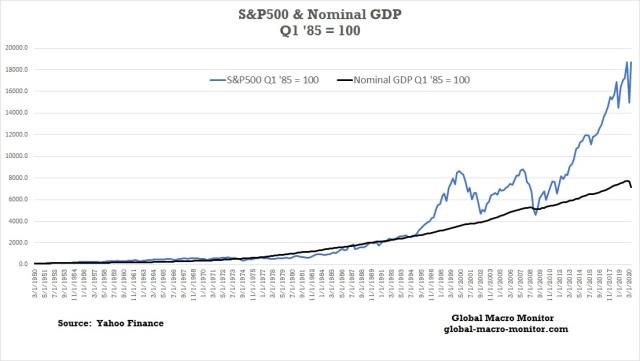Why So Few Bears Own Park Avenue Apartments
Tyler Durden
Thu, 06/11/2020 – 20:45
Summary
- Bears can’t win the long-game, the probabilities are stacked against them as stocks (DJIA) have generated positive returns for almost 70 percent of the last 100 years
- Bears also face a relatively new (since the 1990s) headwind, that is rent-seeking behavior of the investment markets, where the rules of the game are changed when the market moves in the bears’ favor
- Stocks remain divorced from economic reality and are not optimal initial conditions for a sustained and stable new bull market
Good question, easy answer.
Probabilities Are Against Bears
First, the bears begin in a big hole with the probabilities stacked against them. We wrote an extensive analysis on this subject in our March 2019, Permabulls For Long Run.
The above data show the stock market in terms of the Dow Jones Industrials has generated positive returns for almost 70 percent of the past 100 years. Those are difficult probabilities to bet against and remain solvent.
Growth
The stock market is invariably linked to the economy over the long run, and the natural state of the economic trajectory is for growth, which, in most cases, generates profits that fuel stock rallies. Betting against that scenario for a prolonged period is the fastest way to the poor house.
Rent-seeking Shareholder Class
Second, we have been working on a piece for weeks, which has turned into a tome, Rent-Seeking Nation. It should be out soon but our idea was sparked by an excellent piece written by our good friend, Joe Calhoun, CEO of Alhambra Investments, titled Here Come The Crony Capitalists. If you haven’t read it, run don’t walk to consume it.
Joe understands what is current at stake for the global economy, the consequences of bad policy, and understands risk, and how to manage it. We mentioned in an earlier post that we live in times where it is important to have an experienced portfolio manager, who understands how to manage left-tail risk. Joe is one of the best.
Rent-Seeking
Rent-seeking
the fact or practice of manipulating public policy or economic conditions as a strategy for increasing profits. “cronyism and rent-seeking have become an integral part of the way our biggest companies do business – Lexico
Bears face another difficulty in that the investor class, led by Wall Street and the financial media have tremendous influence over public policy, monetary policy, in particular.
It seems evident, at least to us, that when market forces assert themselves to pressure stocks to move back to more realistic and reasonable valuations, monetary policymakers intervene and change the rules of the game against the bears. We are not arguing this the primary objective of monetary policy but it is, in fact, the end result.
The Stock Market and Economy
The chart below illustrates how divorced the current stock market is from economic reality. It is just another form of our favorite valuation metric, stock market capitalization-to-GDP.
The above data show that the annual trend growth of the S&P500 and nominal GDP tracked quite well up until the dot.com bubble, which began in the mid-1990s. The major bear markets of 2000–02 and 2007-09 caused the stock market to revert back close to trend GDP but stocks were soon reflated again by easy monetary policy.
There are many plausible reasons that caused this structural shift, which we won’t go into now. Contact us if you’re interested.
Economic Stability
The optimal and most stable dual path, in our opinion, is where both series track each other as was the case pre-1995.
At current levels, the stock market is way out of line with trend GDP. Yet, we heard, even today, on the financial television that we may be at the start of a new bull market. Seriously?
Stare at the chart for a few minutes and ask yourself, is that a realistic, high probability scenario? It is possible the laws of gravity with respect to stock valuations have been permanently suspended but we don’t think it is likely.
What is also notable from the chart is that the bubbles keep getting larger and larger. In fact, stocks may now be so far out of line with the economy that it is impossible to “land the plane” without destroying the world. How did we allow ourselves to get here?
Laws Of Economics Suspended
There is now a rapidly growing group of people who think the laws of economics have been suspended. That is there are no constraints on financial resources and don’t seem to have a problem with trillion-dollar deficits, most of which are now monetized, weak bond auctions (today’s 10-year), and a weakening currency
As macro observers, we are not fond of that cocktail, though, given the COVID crisis we don’t seem to have much choice on the massive deficit and debt monetization.
The macro boys at GMM remain uncomfortable, however, and that is why our position remains in cash and gold. Let them have their bull market.
Note this is not the case with our stock picker, Carol, who is fighting some health issues and probably would have weighed in here.
Initial Conditions For A New Bull Market
By the way, the average initial valuation of new bull markets from 1974 to 2009, was a stock market capitalization-to-GDP of 53.1 percent. The new bull market, which they tell us began on March 23rd was almost double that at 105.3 percent and now approaching 170 percent, more the 25 points above the peak level of the dot.com bubble. Sure the economy has bottomed and should get a record bounce in Q3, but stunning, nonetheless.
Upshot
The market — well, not really a market anymore after the Fed has effectively nationalized the bond markets — looks like a screaming short given the above chart. Just remember bears, you’re betting against the long-run probabilities skewed against you, and also understand that the referees will change the rules of the game if you start winning big. Rent-seeking is ubiqutious and now trumps market forces, which is a major factor why even the United States is morphing into a zombie economy.
via ZeroHedge News https://ift.tt/2Arr73j Tyler Durden

